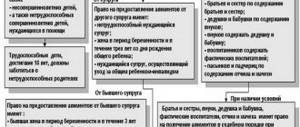Family law contains a mandatory rule, i.e. a rule that must be strictly observed and under any circumstances, that parents have an obligation to financially provide for their own minor children, including paying child support when he lives with his ex-husband (wife) or cohabitant (cohabitant). At the same time, the above does not mean that there can be no exemption from paying alimony for minor children until they reach the age of 18. For release, it is sufficient that the father or mother from whom alimony benefits are collected legally cease to be the parents of a minor child. In other words, it is necessary that the record of their paternity or maternity be excluded from the minor’s birth certificate and from the civil registry office books.
Since the termination of alimony obligations in relation to a young child directly affects his right to physical existence and satisfaction of his material needs, the law allows only a judicial procedure for the annulment of alimony obligations. Read on to find out on what grounds this happens, how to file a claim to cancel the alimony obligation, and what documents are needed in this case.
The main reasons for stopping alimony payments
The table below shows the grounds and procedure for cases where alimony is ordered to be paid by a court decision. Keep in mind that it is not possible to suspend alimony payments for any limited period of time. The accumulation of alimony debt will sooner or later lead to the fact that the bailiffs will become interested in the alimony provider and apply various coercive measures to him, for example, seizure of liquid property, a ban on using a car or traveling abroad, and also bring him to administrative responsibility.
| Reasons | Legal comment |
| Challenging paternity (maternity) | The Family Code states that maternity is established on the basis of the following evidence:
Paternity is determined by the following criteria:
Of course, not all records of paternity (maternity) are reliable, since in some cases people are raising other people's children and do not know about it. For such situations, it is possible to challenge paternity (maternity). Persons who have the right to file a complaint against the defendant in court include:
There is 1 exception that prohibits the plaintiff from bringing his claims to court. If the plaintiff knew that the child was not from him (her), was not officially married to the second parent, but nevertheless agreed to register as the mother (father), then the claim documents will be returned by the court without consideration. |
| Refusal of paternity (maternity) | There is a prejudice that parental rights can be waived in court and after that the child will lose the right to child support. Indeed, the law does not prohibit voluntarily depriving oneself of parental rights through the court, but, at the same time, does not allow the alimony payer to refuse to fulfill alimony obligations to his own young son or daughter. In other words, you will have to support your children in any case until they are adopted by other people. It must be taken into account that such a decision entails a number of negative consequences for the alimony payer, namely:
Based on this, it is worth thinking carefully about whether it is necessary to revoke the rights to the child through the court if alimony still has to be paid, and there are a lot of disadvantages in the emerging situation. Until the child is adopted, payment of child support and debts remains the responsibility of the parent. |
| Adopting a child | Adoption is a legal process, the result of which is a change in the record of the mother or father of the child in the state registry office. The transfer of a minor child to an adoptive parent is permitted only through the court and only with the consent of his biological parents and the child himself, if he is over 10 years old. It should be noted that when one of the parents renounces motherhood (paternity) and is deprived of rights to the child, the potential adoptive parent must wait six months before applying to the court for adoption. If a court decision favorable to the adoptive parent comes into force, he receives all parental rights in relation to the minor child, for example, the right to educate and raise him, the right to live with him at the same place of residence, etc. |
If alimony is paid by agreement, then the following grounds for annulment of the alimony obligation are allowed:
- Expiration of the alimony agreement.
- Death of either the alimony recipient or the alimony payer.
- Other circumstances, for example, the parties agreed that the payer is obliged to transfer ownership of a 2-room apartment to a young child as alimony. Starting from the day when the housing becomes the property of the child, the alimony obligation is considered terminated.
Grounds for filing a claim
Exemption from payment of alimony debt, according to Art. 114 of the Russian Family Code, is also permitted with the consent of the interested parties, if we are not talking about alimony payments for children. In the latter case, drawing up an appropriate claim is necessary.
A claim for cancellation of payment of arrears of alimony can be satisfied in court only if the following grounds exist simultaneously:
- serious illness of the alimony payer or other reasons recognized as valid during the legal proceedings;
- such financial or marital status of the plaintiff-payer of alimony payments, in which he does not actually have the opportunity to pay off the accumulated debt on alimony payments (for example, lack of work due to illness, birth of dependents in the family of the alimony payer and other reasons).
Methodology for exemption from alimony
When challenging paternity (maternity)
So, the plaintiff has reasonable suspicions that he (she) is not paying child support for his child and wants to get rid of this obligation. Before going to court, you need to consider 2 nuances:
- This trial will be very difficult from a psychological point of view, in particular, moral pressure and condemnation from both the defendant and the judge are possible.
- Taking into account what is written in paragraph 1, evidence of the absence of the fact of motherhood (paternity) should be practically reinforced concrete. Therefore, it is necessary to do a genetic examination in advance, i.e. before going to court. In such disputes, expertise is the only way to 100% defend your point of view.
Where should I submit documents? According to the civil procedural law, documents should be transferred to the district court located at the official place of residence of the second party, i.e. defendant.
The circumstances of the dispute and information about the evidence are indicated in the statement of claim, the drafting of which should be approached very carefully. What is usually written in the application? In particular, they provide answers to the following questions:
- Why is the plaintiff recorded in the register books of the state registry office as a mother (father)? On what grounds?
- What binds the defendant and the plaintiff together, for example, marriage, casual relationship, friendship or something else?
- The most important point: the answer to the question “Why can’t the plaintiff be the parent?” Here is information about all available evidence. You must also remember to submit the collected written evidence along with your application.
- Does the plaintiff know who the real parent is?
For a visual template that you can use when writing your application, click on this link. To pay the state fee, go to the court’s website, find the details, print them and go to any bank branch. After transferring the money, do not forget to pick up the receipt.
As mentioned above, this process is usually very difficult for plaintiffs, so it would be advisable to ask in the statement of claim for a trial in the absence of the plaintiff. Of course, this should only be done if genetic testing has shown that the plaintiff cannot be the mother or father of the child. This request gives the judge the right to enter a default judgment without the presence of the plaintiff.
The trial, as a rule, takes place in one session if there are documents on genetic examination. Otherwise, the judge orders an examination and postpones the trial until the results are received.
If the plaintiff was able to prove the fact that there is no relationship with a minor child, then he must wait until the decision comes into force (30 days from the date of its writing in final form). Then, with this court decision, the plaintiff must go to the state registry office, which registered him (her) as the father (mother) and submit an application demanding to cancel the record of paternity (maternity). Only after the entry is deleted from the deed book will the alimony obligation be officially terminated.
When adopting a child
Regardless of whether parental rights have been previously terminated or not, a parent who intends to relieve himself of the obligation to pay child support must consent to the adoption of his own minor child by another person. This can be done in 3 ways:
- State your consent orally in court.
- Go to a notary and write a statement in his presence. Next, the application is certified by a notary.
- Go to the state guardianship agency and write a statement of consent to adoption addressed to the head of the state guardianship agency.
Of course, a legally savvy adoptive parent will require notarized consent, since the parent may simply not come to the court hearing or refuse the oral promises he previously made. In the end, notarized consent makes life easier for the parent, since he (she) does not need to waste time in court and communicating with the adoptive parent.
Keep in mind that the law allows you to waive consent from parents who:
- Are incompetent.
- Parental rights have been deprived for more than six months.
- Due to unjustifiable circumstances established in the court decision, they do not take care of the child for more than six months, for example, they do not raise or support him, and they do not live with him in the same territory.
- They are missing, and this fact is recorded in the court decision.
- Unknown.
How to file a claim for exemption from alimony payments?
Drawing up a statement of claim on the issue of exemption from payment of alimony is based on the current requirements of the Civil Procedure Code of the Russian Federation. According to it, the plaintiff must comply with the structure of the statement of claim, and also submit the statement exclusively in writing. By the way, on the issue we are considering, cases are considered by magistrates.
The statement of claim must indicate the following facts:
- Name of the court;
- Details of the plaintiff and defendant;
- Formulate key information on your problem;
- Indicate the specific requirements of the statement of claim.
Be sure to pay attention to the circumstances in connection with which you are filing a claim for exemption from alimony payments. They must comply with the norms of the Family Code (change in the family status of the recipient of alimony, deterioration in the financial capabilities of the payer, health problems, etc.).
In your statement of claim, you must refer to specific articles of the laws that guided you when drawing up the claim. This is also one of the requirements of the Civil Procedure.
And if you have any questions regarding the claim, you can always find out the answers to them as part of a free legal consultation from Pravo Group! Better yet, entrust the preparation of the claim to our specialists! This way you will receive a 100% guarantee that the law will take your side!
List of documents for filing a claim and the amount of state duty
| Challenging paternity (maternity) | Adopting a child |
The state duty is 300 rubles. + 650 rub. to correct the record of maternity (paternity) in the registry office. | From a parent intending to transfer his minor child to another person (adoptive parent), only consent is required. It can be given in the following ways:
Of course, methods 1 and 2 are more convenient and have several significant advantages, including the opportunity not to be present at the trial (the decision will be made in absentia), as well as to avoid moral condemnation during the court hearing. As for the adoptive parent, he will need:
The state duty for this category of claims for the adoptive parent is 300 rubles. |
Arbitrage practice
Challenging paternity (maternity)
The case was heard in the Severodvinsk City Court of the Arkhangelsk Region in December 2021.
The man filed a lawsuit against his former partner. In the statement he wrote the following information:
- He actually had a civil relationship with the defendant for about 8 years.
- During this relationship, the defendant had a daughter. The plaintiff was recorded as her father.
- In October 2021, he conducted a genetic examination and learned that his partner had given birth to a girl from another person. Before this examination, the plaintiff did not know that the girl’s father was another man.
In connection with the above circumstances, the applicant demanded that the record of his paternity be annulled. The respondent admitted the applicant's claims and recorded the confession in a written statement.
The judge decided that the evidence presented (genetic examination, recognition of the plaintiff’s claims by the defendant) was sufficient to satisfy the claims.
Adopting a child
The case was heard in the Ussuriysk City Court of the Primorsky Territory in November 2015.
The applicant expressed a desire to adopt his wife's son and filed a corresponding claim in the city court of Ussuriysk. He justified his demands:
- Having a good relationship with the child being adopted.
- The presence of an official marriage with the mother of the child being adopted.
- The father's consent to the adoption.
- Availability of the required level of income to satisfy the basic needs of the minor.
- The mother's consent to the adoption.
- The presence of a positive conclusion from the prosecutor.
- The presence of a conclusion from the state guardianship agency, which recognized the feasibility of adoption.
Based on the evidence presented, the judge recognized that the claims were in the interests of the minor, and adoption would ensure his full development. In addition, the fact of adoption does not infringe on the rights of other persons, in particular, a biological father who agreed to give his child to another man.
Exemption from alimony payments
The payer, who finds himself in a difficult life situation, strives to get rid of both the debt and obligations in general. This applies not only to payments in favor of children, but also to assistance to the child’s mother raising a baby or disabled child; parents; relatives in need of help.
The grounds for termination of obligations are listed in Art. 120 IC RF:
- Upon expiration of the agreement on the basis of which collections were made, or in the event of the death of one of the parties to the agreement (payer, recipient).
- When the child reaches adulthood. In exceptional cases - upon emancipation - it is possible to terminate alimony from the age of 16 (Article 27 of the Civil Code of the Russian Federation, Article 21 of the Civil Code of the Russian Federation). Full legal capacity occurs upon entering into a legal marriage, when carrying out entrepreneurial activities or working under a contract or employment contract. If the payer proves that the child receives income that exceeds the parent’s earnings and is ready for full self-sufficiency, the court may cancel the child support debt.
- In the case of adoption of a child in whose favor alimony was withheld.
- If the recipient, who was assigned alimony due to incapacity and need, became capable or began to receive other types of income.
- When the former spouse receiving alimony enters into a new legal marriage.
- In the event of the death of one of the parties.
Only under these circumstances can you be completely freed from alimony. In other cases - if health deteriorates, other children appear, we can only talk about reducing the amount of payments.
Regulatory framework
| Laws | Articles |
| Family code | Article 48 describes how the origin of a minor child can be established. Article 52 explains how maternity or paternity can be challenged. Article 70 explains the peculiarities of legal proceedings in cases related to the annulment of parental rights. Article 71 contains a list of restrictions for parents deprived of rights in relation to their child. Article 120 describes the grounds upon the occurrence of which the payment of alimony is terminated. Article 125 describes the peculiarities of the judicial process when considering adoption cases. Article 129 describes the ways in which parents have the right to give consent to the adoption of children by other people. Article 130 contains a list of circumstances when parental consent for adoption is not required. Article 137 contains a list of the legal consequences of adoption. |
| Tax Code (Part 2) | Article 333.19 contains the amount of fees paid by the interested party for the proceedings in court. Article 333.26 contains the amount of fees paid by the applicant before receiving government services at the Civil Registry Office. |
Claim for exemption from payment of arrears of alimony
The plaintiff asks to be released from paying the debt under the court order for the collection of alimony in favor of the defendant for the maintenance of her daughter.
To the magistrate of judicial district No. ___, ________ ________________________________
Plaintiff: ________________________________ Address: ________________________________
Defendant: ________________________________ Address: ________________________________
Third parties: ________________________________ Address: ________________________________
OSP UFSSP for the city _________ in the Southern Administrative District, Bailiff _________________ Address: ________________________________
STATEMENT OF CLAIM for exemption from payment of arrears of alimony
____________ of the year __________ the district court of the city of ________ issued a court order to collect from me in favor of the defendant, ____________, for the maintenance of my minor daughter, ___________________, __________, alimony in the amount of ¼ of all types of earnings monthly, starting from the year ____________ and until the child's coming of age. “___” __________ year, the justice of the peace of the judicial district No. ___ of the district “_____________” of the city of _______ in a civil case in a claim ___________ against me for the collection of alimony made a decision to collect from me in favor of ___________ for the maintenance of three minor children alimony in the amount of 1/2 of my income. Currently, a debt has arisen under a court order ordering the collection of alimony from me in favor of the defendant, ____________, in the amount of ________ rubles __ kopecks. I love my children, I have always taken and wish in the future to take part in their upbringing and maintenance, however, at present, due to a significant change in my family and financial situation, I am not able to repay the resulting arrears in payment of alimony in favor of the defendant, _______________
Circumstances preventing me from repaying the debt under a court order ordering the collection of alimony from me in favor of the defendant, ___________, in the amount established by the bailiff: - __________ of the year I entered into a marriage registered by the registry office with gr. _________________, which is confirmed by the marriage certificate series I-MU number ________, issued by the ________ department of the Civil Registry Office of the city ________ _________. My wife does not work, she is on my full financial and living support. — On the _________ year my daughter was born ______________, which is confirmed by the birth certificate series II-MU number _________, issued by the ___________ Civil Registry Office of the Civil Registry Office of the city _________ ________; — On the ________ year my daughter was born, _________________, which is confirmed by the birth certificate series III-MU number _________, issued by the ____________ Department of the Civil Registry Office of the Civil Registry Office of the city __________ __________; — On the ___________ year my daughter was born, _____________, which is confirmed by the birth certificate series IV-MU number ________, issued by the __________ department of the Civil Registry Office of the Civil Registry Office of the city _________ __________. The total amount of alimony collected from me is 75% of my monthly earnings, which exceeds the established amount by law, the share of child support paid for three or more children.
Having child support and income taxes withheld from my pay makes it impossible for me to adequately support myself.
According to Art. 119 of the RF IC, if, after the amount of alimony has been established in court, the financial or marital status of one of the parties has changed, the court has the right, at the request of either party, to exempt the person obligated to pay alimony from paying it. When exempting them from payment, the court also has the right to take into account other noteworthy interests of the parties.
In paragraph 14 of the Resolution of the Plenum of the Supreme Court of the Russian Federation dated October 25, 1996 No. 9 “On the application by courts of the Family Code of the Russian Federation when considering cases of establishing paternity and the collection of alimony” it is explained that when changing the amount of alimony or exemption from its payment ( Clause 1 of Article 119 of the RF IC) the court takes into account the financial and marital status of the parties, as well as other noteworthy circumstances or interests of the parties (for example, the incapacity of family members to whom the party is legally obliged to provide maintenance, the onset of disability or the presence of a disease that prevents continuation of previous work, the child entering the workforce or engaging in entrepreneurial activity). Thus, in view of the significant change in my family and financial situation, I believe it is necessary to release me from paying the debt under the said court order. Based on the above, guided by Art. 119 of the RF IC, I ASK: 1. Release me, _________________, from paying the debt under the court order for the collection of alimony in favor of the defendant, ___________, for the maintenance of my daughter, ______________________, ________ year of birth, in the amount of _________ rubles ___ kopecks.
APPENDIX: copy of this statement of claim - 3 copies; Copy of the court order – 4 copies; A copy of the court decision on the collection of alimony – 4 copies; A copy of the marriage certificate – 4 copies; Copy of birth certificate ______________ - 4 copies; Copy of birth certificate ______________ - 4 copies; Copy of birth certificate ______________ – 4 copies; A copy of the plaintiff’s income certificate – 4 copies; Receipt for payment of state duty.
"___" ______________ G. _________/____________/









